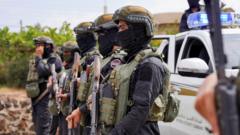The Democratic Republic of Congo and M23 rebel group have signed a significant ceasefire agreement in Qatar, outlining principles to curb violence, restore state authority, and work towards lasting peace amidst ongoing conflict.
DR Congo and M23 Rebels Ink Peace Deal in Qatar

DR Congo and M23 Rebels Ink Peace Deal in Qatar
A new ceasefire agreement seeks to end hostilities in the eastern Democratic Republic of Congo as fighting escalates recently.
The Democratic Republic of Congo (DRC) and the M23 rebel group have officially signed a ceasefire agreement in Qatar, setting the stage for potentially ending the recent conflict that has escalated in the region. Known as the Declaration of Principles, this agreement, reached on Saturday, stipulates that both parties must refrain from violence, avoid "hate propaganda," and not attempt to seize new territories through force.
This ceasefire is intended as a framework towards a more permanent resolution, with both sides committing to uphold the terms by July 29. A conclusive peace agreement is expected by August 18, and it is crucial that this deal aligns with a prior U.S.-mediated arrangement between the DRC and Rwanda, which refutes claims that Rwanda supports the M23 rebels.
The recent conflict has resulted in massive devastation, particularly in eastern DRC, where the M23 group has gained control over key areas such as the mineral-rich towns of Goma and Bukavu, leading to thousands of deaths and displacing hundreds of thousands of civilians. While the DRC governmental spokesperson, Patrick Muyaya, emphasized that the terms of the agreement considered the withdrawal of M23 forces from occupied territories as a non-negotiable point, M23 negotiator Benjamin Mbonimpa indicated in a video statement that the agreement did not clearly address this issue.
Interestingly, this marks the first direct resolution attempt since the M23 launched its offensive at the beginning of the year. Qatar's involvement suggests that negotiations may continue, with the African Union Commission labeling this declaration a significant stride towards lasting peace and security.
The declaration also includes commitments to restoring state governance in eastern DRC, although historians note that many previous peace accords in the area have failed to yield substantial results. The M23's origins can be traced back to a peace agreement that fell short of ensuring demobilization 16 years ago.
In the context of these negotiations, DRC President Félix Tshisekedi and Rwandan President Paul Kagame had a separate meeting in Qatar, urging an immediate ceasefire. Following that, calls for a ceasefire were echoed between DRC and M23, but on-the-ground fighting continued. Critics have raised questions about the motives behind the U.S. intervention and the potential exploitation of the DRC’s rich mineral resources.
Despite ongoing tensions, speculation swirls about potential high-level meetings between President Tshisekedi and former President Trump in Washington, though a specific date remains unannounced.
















